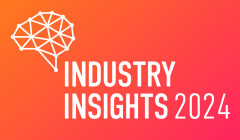
Creativebrief unveils the trends shaping modern marketing
The Industry Insights 2024 report explores the topics on marketing leaders minds today

Katy Wright, CEO, FCB Inferno and Sam Budd, CEO and Founder, Buddy Media share their personal experiences of dyslexia for Dyslexia Awareness Week.

This week marks Dyslexia Awareness Week and while one in five people in the UK are estimated to have dyslexia, the workplace remains largely unaccommodating. From open-plan offices where giving any one thing your full attention is verging on impossible, to workplace messaging systems designed to interrupt, creative workplaces are rarely built with neurodiversity in mind.
Yet as the industry strives to become more inclusive, ensuring this extends to those that are neurodiverse is extremely important. People with dyslexia tend to excel creatively and have great problem solving skills; skills which are crucial in the advertising sector. So creating a workplace in which they can successfully bring their full selves to work is vital.
You need only look at the multitude of dyslexic leaders to know that great minds do not all think alike. With this in mind we asked Katy Wright, CEO, FCB Inferno and Sam Budd, CEO and Founder, Buddy Media about their experience of dyslexia to mark Dyslexia Awareness Week.


Katy Wright, CEO of FCB Inferno: Very early on I had heard that if you have dyslexia, you can’t do a number of things. Having never been a fan of the phrase ‘You can’t do this, because of X’. I was never diagnosed at school and I’m pretty sure those early coping mechanisms I developed have helped me in everything I do today.
Maybe everyone should think of a presentation like a story. No one is ever going to say, ‘What I loved most about you was how you read your slides to me’. They are going to enjoy eye contact and someone listening. I’ve always felt that where some skills like spelling may be lacking, it means that other areas are more free flowing.
I’ve always felt my brain just works really quickly, which is why the words on pages might jump around. It didn’t mean I couldn’t read, and I’ve grown to fall in love with books now. But the truth is I think a big factor in my career is resilience, and on a really practical level – not seeing problems as problems and a natural ability to form strong relationships because I believe people around me feel heard, has really helped me. A lot of that natural curiosity and intuitive behaviour, from what I know now I thank my dyslexia for.
I'm a very visual person, helpful in a creative industry, or indeed any business, simplifying the problem and asking what if, or daring to just change because what we’ve always done isn’t always right. Being a part of a team has ensured that this skill is viewed as something valuable and that’s been incredible.
Sam Budd, CEO and Founder, Buddy Media, adds: “I have always really struggled with creating and designing documentation, be it essays, pitch decks etc so I have leveraged the likes of public speaking and verbal collaboration wherever possible. This has made me a highly effective communicator and storyteller and led me towards sales and leadership roles from the very start of my career.
The truth is I think a big factor in my career is resilience, and on a really practical level – not seeing problems as problems and a natural ability to form strong relationships because I believe people around me feel heard, has really helped me. A lot of that natural curiosity and intuitive behaviour, from what I know now I thank my dyslexia for.
Katy Wright, CEO, FCB Inferno
Katy: Ultimately it made me find the right job for me and there is something to be said for doing something you love. That being said – I also work hard and having a strong work ethic has helped. Which again looking back with hindsight, I may have learnt very early on those coping mechanisms that meant reading things several times, triple checking spelling etc. Using technology to help me, always writing emails to myself before sending (not a bad thing to do, with or without dyslexia in many cases!).
Sam: It has led to some incredible stressful mistakes and often slowed me down at times when I needed to deliver urgently. It’s certainly given me some pretty anxiety inducing moments over the years - I once paid some with 2 extra 00's which proved costly!
A: Katy: You become a good communicator and storyteller. Your strengths also include empathy, emotional intelligence, common sense, and curiosity which has all helped me push for more from myself. I’m constantly pressing the reset button. What I mean by that is, just because we’ve always done something one way doesn’t mean it’s the best moving forward. Simplify, and by that, I mean what can feel complex often isn’t and we don’t have to make it so.
Sam: I genuinely believe Dyslexia has a profound effect in the way you think and sometimes I find my brain operates 10 x to some of my peers when it comes to ideation or how to navigate challenges. Again the need to have such a verbal approach to my life has helped me win clients such as Apple, Spotify, Just Eat etc when I was in my early 20s or help convince investors to buy into a vision.
Katy: There is something in those I think who are told ‘no’, it’s in their nature to disrupt and hope to do things better. Maybe we don’t see the world in the same way, or where others see problems, we can see opportunities.
I’ve never not been driven by phrases like ‘that’s not possible’ or ‘you can’t do that’ and I’m sure it was the same for Steve Jobs, John Lennon, Ed Sheeran, Steven Spielberg, Lewis Hamilton, Roald Dahl and Tom Ford. As the saying goes, ‘People who say it can’t be done, should not interrupt those who are doing it.
Sam: I believe it’s down to our ability to communicate and tell stories extremely effectively as well as the fact that our brains just seem to be wired up differently in terms of the way we see the world.
Looks like you need to create a Creativebrief account to perform this action.
Create account Sign inLooks like you need to create a Creativebrief account to perform this action.
Create account Sign in